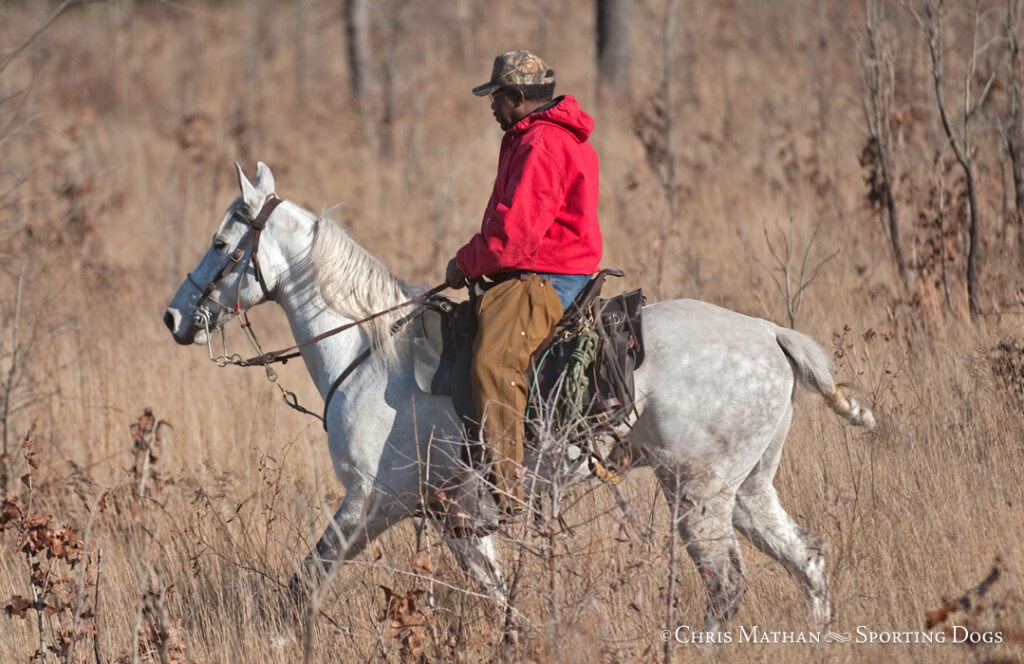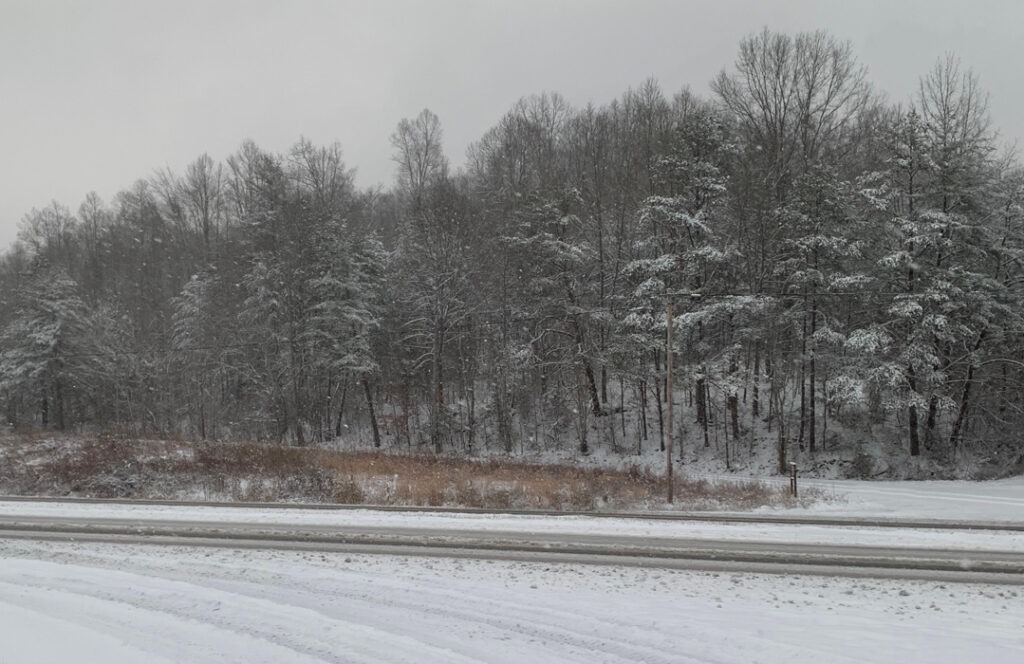They were two-man teams of rivals. Some thought enemies, but they were not. They were famous, in a very small, obscure world. Each was a trainer-handler or a scout of all-age pointing dogs.
Each handler worked with a scout, usually a black man, who traveled with him in a two-ton stock-bed truck they drove from trial to trial hauling the horses they rode to handle and scout off of and the dogs in the string of pointers (and occasionally a setter) they entered in the trials.
Each team usually had two dogs in its string it counted on to place or win fairly frequently, and four to eight others that seldom placed but their owners loved them and so paid their training and entry fees. That helped cover the nut for the team but these dogs stood little chance of placing, much less winning and in a year or so would rotate off the string and be shipped home to their owners or elsewhere.
It was pretty much the same for each of the twenty-odd handler-scout teams running all-age dogs across the continent on the three unofficial and overlapping all-age circuits, western, Mississippi drainage and piney woods, known collectively as the major circuit.
No handler earned more than subsistence income. But they worked for no one else and saddled no other man’s horse and could tell any man (not an owner of a dog in their string) to kiss their ass, or so they told themselves. They never did it because their independence quelled any need to be quarrelsome, except occasionally among themselves. They were fierce competitors.
It was midnight Thursday, Thanksgiving, and both teams were rolling south from an Illinois pheasant trial to Paducah, Kentucky to run in the 196- Quail Championship Invitational, the trial for the twelve top dogs based on their Purina Points, a new measure since 1963 and most agreed a fair one that took account of entry numbers in stakes won or placed in. Each team had one dog in the Invitational. They would stay after and run their entire strings in the following Kentucky Quail Classic all-age and derby stakes. Each team had two derbies in its string. (Derbies were two year olds).
The lead truck blew its left front tire thirty miles north of Paducah. The scout was driving and skillfully held the swerving truck on the blacktop. He had driven an Army Duece-and-a-Half across France and Germany after D-Day and that experience served him well on this pitch-black night.
They had no spare. Had traded the one usually bolted under the frame for a tank of gas a week earlier to get to the pheasant trial. The handler and scout looked at one another, despair on their faces. Then a near identical truck traveling the same direction passed them, recognized them and at first opportunity turned around and came back to the scene of the blowout where flares now lit the disabled truck, parked only half off the blacktop.
The second truck parked safely and fully off the blacktop nearby and its two occupants walked to the flare-lit scene of the blowout.
“Can we help you get your spare on?” asked the handler.
A silence, then from the other handler, “Ain’t got a spare.”
Another silence, this one longer, then, “I’ll lend you mine. Bob, you and Willie go get it.”
The scouts walked to the other truck and, removing the four-way-cross lug wrench from beneath the seat, Bob unbolted the spare from the truck’s frame and together the scouts rolled it toward the disabled truck. (The trucks were both ‘56 Dodges so the wheels holding their tires should be identical.)
Meanwhile the handlers had found the hydraulic jack and managed to lift the left front frame of the disabled truck enough to remove the the blown tire and its wheel.
The scouts mounted the borrowed spare wheel and tire on the exposed lugs (thankfully they did fit) and tightened the lug nuts, then lowered the hydraulic jack and returned it to its bracket behind the truck’s seat.
The handlers shook hands, the scouts nodded and smiled to one another and the teams were rolling to Paducah again. They arrived in time to unload at the trial headquarters, formerly part of the Kentucky Ordinance Works where during the Second World War almost two hundred tons of TNT had been manufactured and stored in bunkers constructed to send the force of an accidental blast upward, the bunkers now used for stables. Each team’s stock would occupy a stable, with its dogs attached to a tie out chain stretched down the bunker-stable’s center isle.
The stock and dogs fed and watered, the teams drove to the Days Inn in town and checked into their two reserved rooms for a short nap before breakfast. Rising for a late breakfast they grabbed donuts and coffee and drove to trial headquarters, now the clubhouse of the West Kentucky Wildlife Management Area, where they again looked after their stock and dogs. That afternoon they would road from horseback four of the dogs in each string before returning to town for the drawing of the Invitational and Classic and Derby stakes, held at a municipal facility. Cocktails and finger food preceded the drawing and dog owners and handlers here from across America caught up. The scouts were gathered elsewhere having their own party.
The Invitational’s format was ingenious and in future years it would be much copied. Each of the twelve entries would be drawn to go an hour the first day, then another hour the second day with another bracemate. Those drawing a morning brace Saturday would be assigned an afternoon brace Sunday and vice versa. (After Sunday’s running the three judges, including a professional handler, would select and announce finalists — usually four plus standbys — to go two hours Monday). The Champion and at the judges discretion a Runner-Up would be named, considering all three days running as one race. Endurance, range and consistency were to be rewarded.
After Sunday’s running, just two dogs were called back to go Monday (but four were put on standby if the first brace did not produce performances meeting the judges’ expectations). One dog from each of the strings involved in the blowout incident of Thursday night were called back.
Monday dawned cold and overcast. Bob and Willie conferred unseen before the breakaway.
The three judges, handlers and scouts (leading the finalist dogs on reins) marshals and a gallery of thirty riders, wrapped in every garment available, gathered for the breakaway. A prayer was offered by the Invitational’s chairman, and the senior judge said, “Let ‘em go.”
In ten minutes, snow began to spit. All prayed it would not accumulate enough to form a white cover. Thankfully it did not, but conditions proved ideal to quail movement and in the first hour each dog scored three limb finds on which they were found pointed by their scouts.
The second hour the snow stopped, the sky cleared and wind abated, and the temperature dropped further. The dogs continued to run big, forward, searching races but were not rewarded by finds. When time was called, both dogs were unseen. The judges conferred and announced a thirty minute grace period. Either dog would make a worthy champion, the gallery being split about equally on the dog to be named champion assuming both were found in time.
The thirty minutes clicked down as judges and gallery sat their mounts shivering on a ridge top and handlers and scouts searched unseen, handlers calling to their dogs, scouts searching silently. At twenty five minutes into the grace period, the distant call of “Point!” was heard by a marshal who relayed it in to the judges, and suddenly those gathered on the hilltop were cantering like a cavalry charge, led by the marshal.
They caught sight of the scout Willie, mounted with cap raised. Then they saw the pointed dog. It was not the dog being scouted by Willie, but by Bob.
The dog’s handler arrived, dismounted, flushed and fired. The dog stayed motionless.
The judges looked at their watches and declared the grace period over.
Willie’s dog was found by Bob a half hour later, on point.
Back at the clubhouse Bob’s dog was named Champion, no Runner-Up. Pictures were taken with the Champion posed on a table in front of the roaring fireplace. No one wanted to go outside for a picture.
The president of the West Kentucky Wildlife Club announced the Classic would commence after lunch which was ready to be served.
The Champion’s handler dispatched his scout Bob on an errand. They had no entry to run until tomorrow.
When the day’s running was over, Bob and his handler-partner walked to the stable-bunker where Willie and his handler-partner were caring for their stock. Bob rolled a new truck tire mounted on a wheel he had found at a junk yard. They presented tire and wheel to Willie and his partner as a gift with their thanks.
* * * * *

Author’s Note: This story is dedicated to David Johnson, Scout, on the occasion of his election to the Field Trial Hall of Fame, class of 2022, induction February 2023 at the National Bird Dog Museum.

A kinda make you feel good all over story. Loved it!